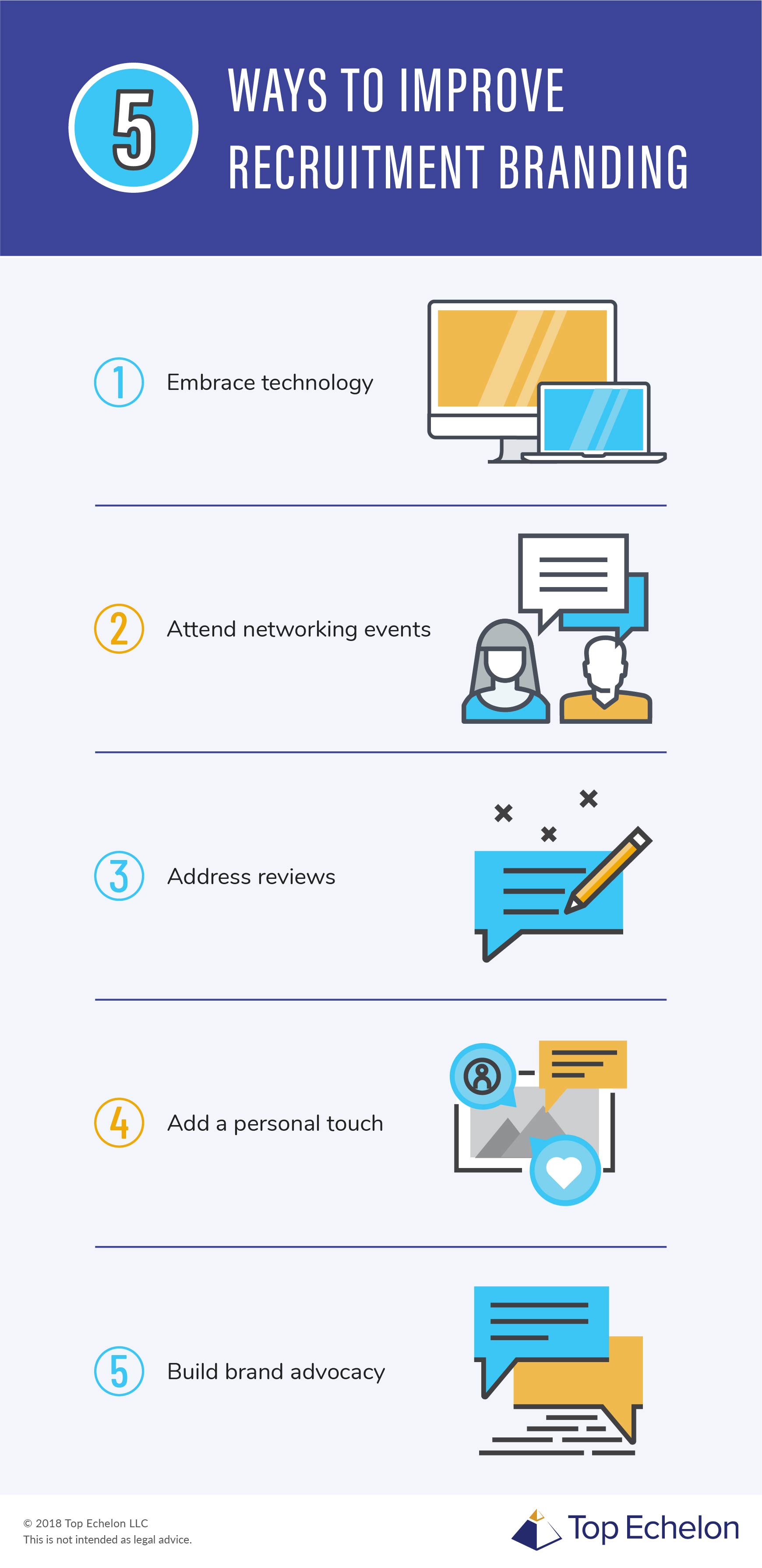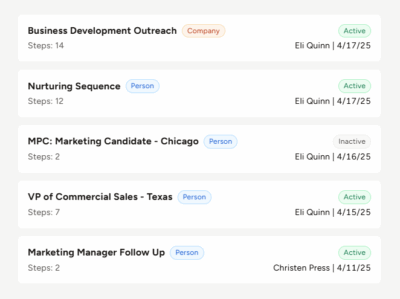Branding is a term that has become more prominent in the employment marketplace and job market during the past several years. This includes both personal branding on the individual level and employer branding at the organizational level. However, it also includes recruiter branding for professional recruiters and executive search consultants!
What is recruiter branding?
Recruiter branding is pretty much the same thing as personal branding, which is the experience that you provide for other people. How you interact with people dictates your personal brand, and this involves everything you do—and even everything that you don’t do. Ultimately, how you’re branded is determined by other people. That’s because they brand you in their own minds based up on the experiences that they’ve had with you.
There are some who use the terms recruitment branding and employer branding interchangeably, and that’s fine if you’re an internal recruiter or a corporate recruiter. That’s because the organization looking to hire is being branded, specifically during the interviewing and hiring process. However, if you’re a professional recruiter or executive search consultant, then recruiter branding refers to YOU. And by extension, it also refers to the agency that you represent.
If a candidate or a client has a negative experience with you (and remember, it’s up to them to decide if that’s the case), then your recruiter brand will be negative. But if, on the other hand, they have a positive experience with you, then your recruiter brand will be positive. As a result, the definition of recruiter branding is the experience that a professional recruiter or executive search consultant provides to job candidates and clients. It is a direct reflection of the service that the recruiter provides to both groups of people. And however the recruiter is branded is often the same way that the agency that they represent is branded.
As Billy Joel would say, it’s a matter of trust
To help us with this discussion of recruiter branding, we’re going to draw upon the expertise of recruiting and staffing industry trainer Barb Bruno, CPC/CTS of Good as Gold Training. According to Barb, candidates and clients were asked to list the most desirable traits for recruiters. That list included the following attributes:
- Candid
- Resilient
- Driven
- Enthusiastic
- Focused
- Optimistic
- Confident
- Solution-oriented vs. problem-oriented
- Tenacious
- Trustworthy
“These are also the traits I’ve observed in top producers in our profession,” said Barb. “Your challenge is to make sure that everyone has a positive experience when working with you, because the reputation and perception of your company is YOU.”
Recruiter branding: perception vs. reality
A recruiter’s relationship with a candidate or a client is like any other relationship. People want to know three things in a relationship, whether they ask you about these things or not:
- Can they trust you?
- Do you care about them?
- Will you do what you promise?
Since you’re a recruiter, job seekers and candidates expect you to find a job for them. At the other end of the spectrum, clients expect you to find top talent, often in unreasonable timeframes. If you don’t meet these expectations, then the people in these groups may share their disappointment on social media or through other ways.
“Your reputation is not the information on your website, it is what people say about you and your company when you are not there,” said Barb. “Think about the experience of candidates you do not place or the clients who provide you with opportunities that you do not fill. What is their perception?”
Candidate perceptions about recruiters
Some common candidate perceptions about recruiters including the following:
- “Recruiters don’t care about me, they just care about filling jobs.”
- “Recruiters are all alike.”
- “Recruiters don’t communicate.”
Client perceptions about recruiters
Some common client perceptions about recruiters including the following:
- “Recruiters give me the same candidates who answered my advertisement.”
- “Recruiters are all alike.”
- “Recruiters are often a waste of my time.”
The keys to branding in recruitment
According to Barb, people do not want to be “sold.” They won’t respond in a positive way if they believe you’re trying to “sell” them too aggressively. She suggests slowing down your presentations to both candidates and clients. This includes asking prospective clients about their current challenges and positioning yourself as the solution and instead of pitching a job to candidate, suggesting a conversation to discuss what they see as their next career move.
“Timing has a tremendous impact on recruiting, and we have human beings on both sides of our sale,” said Barb. “They are not going to make a quicker decision because you want them to. They don’t care about you. They only care about them and will make decisions in their own timeframe and for their own reasons.”
This means that if you want your recruiter branding efforts to be positive and productive, then you must focus on the other person and their needs. If you address their needs and/or solve their problems, then they will remember you and they will do so in a positive way.
“Clients will remember if you ask for a specific target date to fill and get interview times up front, because that shows them you are committed to scheduling interviews and you are also guaranteeing that they will interview your candidates,” said Barb. “Candidates will remember that you worked on their time schedule, which, by the way, can change often. Continue to reconfirm the timeframe of your candidates and clients throughout your process.”
Barb also recommends establishing a follow-up or “touch” program that will allow you to make more successful placements. And by “more successful placements,” we mean placements that do not suffer from fall-offs. With this type of program, you can prevent a small issue from becoming a major problem, with the overriding goal of maintaining your position as a trusted consultant and negotiator.
“If you implement these recruitment branding strategies, then your candidates and clients will remember how you made them feel and you will dramatically escalate your level of success,” said Barb.
More recruitment branding strategies
As we’ve discussed to this point, branding molds all aspects of an organization. And strong recruiter branding is important to attract top talent for your clients.
If your recruitment brand is lacking, then it can limit the pool of candidates you attract. Your image as a recruiter can make or break how potential candidates and clients perceive you.
Here are five ways you can improve your recruitment branding efforts:
1. Embrace technology
Technology lends a huge hand to your recruitment branding strategy. You can use various platforms to reach potential candidates, such as jobs boards and social media (e.g., Twitter or Facebook).
Streamline candidate engagement, applications, and selection process by utilizing websites and platforms. Improving the way you attract and communicate with candidates can enhance their experience. And positive experiences can reinforce and promote your brand.
For example, you may use an online job board to post positions and follow up with candidates. Communicating with candidates through different channels can potentially speed up the hiring process timeline. Speeding up processes can result in positive experiences and change the way candidates view your brand.
2. Attend networking events
Another way to put your brand out there is to attend networking events.
Attending events like career fairs allows you to meet with potential candidates in person. Events allow you to get to know candidates better, give you more time to discuss positions, and set your brand apart. And participating in networking activities can expose you to pools of candidates that you might not be able to access online.
Events can also bring you face-to-face with potential clients. You may meet people looking for recruiters for their company. Or you may meet individuals who know someone who is looking for recruiting services.
Even if you do not find any potential candidates or clients, showcasing your agency or services exposes your recruiter brand to more individuals.
3. Address reviews
Every business has both positive and negative mentions. Although reviews are usually from customers, they can also come from candidates you have interviewed, clients you’ve worked with, or candidates you’ve placed. But if you do not read and respond to reviews, then it can hurt your recruiter brand.
With technology evolving, candidates have more ways to review recruiters about their interview or hiring process.
Keep up with reviews about your recruiting efforts. Be sure to respond to positive (and negative) online reviews. Check your website, social media, and other recruiting platforms regularly for feedback. Use reviews to improve the processes for future candidates.
Responding to feedback might not resolve any candidate issues. But it shows you are trying to improve experiences, which can help your recruitment brand.
4. Add a personal touch
Adding personalization to your recruiter branding efforts can redefine what candidates and clients think about you and your brand.
Candidates have many ways to interact with recruiters, both online and offline. Online, candidates can see your recruitment agency’s job postings, website, and social media posts. Offline interactions may include candidates speaking with current employees or listening to word-of-mouth about your agency.
Regardless of the type of interaction, one thing is for sure: people want a personal touch from recruiters.
As technology advances, find different ways to maintain or enhance your recruitment brand. Consider taking advantage of recruiting software to boost your brand and personalize candidate experiences. Software makes it easier to create personalized communication and interactions. Rather than sending bland messages, customize your templates to set your brand apart from other recruiters and agencies.
5. Build brand advocacy
It should come as no surprise that word-of-mouth plays a significant role in recruiter branding. If a candidate hears something bad about an agency or recruiter, it will likely drive them away. Build up your brand’s reputation by encouraging candidates, employees, and clients to spread positive information.
The more brand advocates you have, the better. Positive word-of-mouth reviews can result in more candidates from which to choose and a better reputation. And brand advocacy can change the way people see your recruitment brand.
(Editor’s note: Maria Tanski contributed to this article.)










